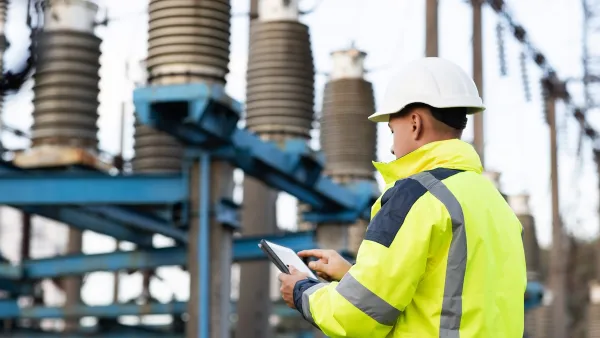Adie Tomer, of the Brookings Institution, writes about the role of artificial intelligence in the new digital age transforming cities.

The new industrial age of the digital era "represents an entirely new platform on top of which many everyday activities operate," according to a brief by Adie Tomer. One of the most important of the new developments of the new digital capabilities of cities is artificial intelligence (AI).
According to Tomer, there is a lot of interest and mystery surrounding AI, including just how AI will fit into the built environment. "Even though AI is still in its infant stages, we already encounter it on a daily basis," explains Tomer. "When your video conference shifts the microphone to pick up the speaker’s voice, when your smartphone automatically reroutes you around traffic, when your thermostat automatically lowers the air conditioning on a cool day—that’s all AI in action."
The bulk of Tomer's article discusses the potential for AI to address and mitigate some of the most pressing challenges facing cities, like climate change and urban resilience, growth and attraction of "tradable" industries, rising inequality, and more.
According to Tomer, there's no need to wait for AI to arrive in cities—it's already built into many day-to-day functions urban residents take for granted (the use of machine learning to better predict future bus arrivals for the mobile app Transit, for instance). But:
Continued experimentation with pilot AI projects and complementary policies are essential to build digital cities that benefit all people. But to deliver such shared prosperity, AI is only a secondary intervention. The first step is the same as it always was, no matter the technological era: Local leadership, from civic groups to elected officials to the business community, must collaborate to codify the shared challenges cities want technology to address. It’s only with a common sense of purpose that cities can tap AI’s full promise.
FULL STORY: Artificial intelligence in America’s digital city

Analysis: Cybertruck Fatality Rate Far Exceeds That of Ford Pinto
The Tesla Cybertruck was recalled seven times last year.

National Parks Layoffs Will Cause Communities to Lose Billions
Thousands of essential park workers were laid off this week, just before the busy spring break season.

Retro-silient?: America’s First “Eco-burb,” The Woodlands Turns 50
A master-planned community north of Houston offers lessons on green infrastructure and resilient design, but falls short of its founder’s lofty affordability and walkability goals.

Test News Post 1
This is a summary

Analysis: Cybertruck Fatality Rate Far Exceeds That of Ford Pinto
The Tesla Cybertruck was recalled seven times last year.

Test News Headline 46
Test for the image on the front page.
Urban Design for Planners 1: Software Tools
This six-course series explores essential urban design concepts using open source software and equips planners with the tools they need to participate fully in the urban design process.
Planning for Universal Design
Learn the tools for implementing Universal Design in planning regulations.
EMC Planning Group, Inc.
Planetizen
Planetizen
Mpact (formerly Rail~Volution)
Great Falls Development Authority, Inc.
HUDs Office of Policy Development and Research
NYU Wagner Graduate School of Public Service




























